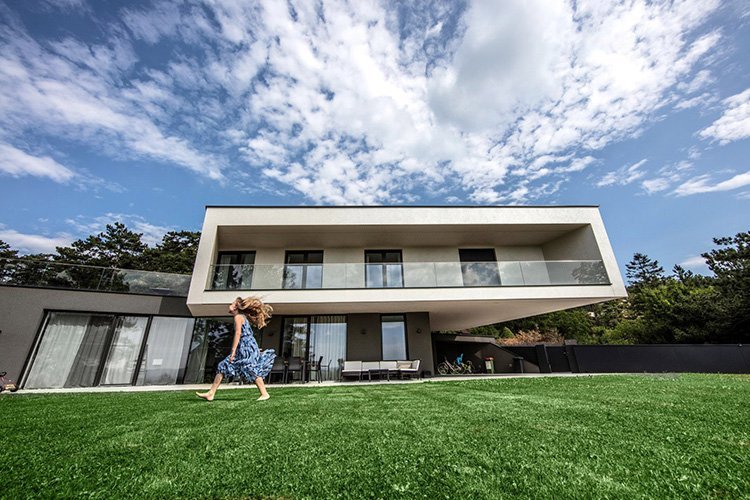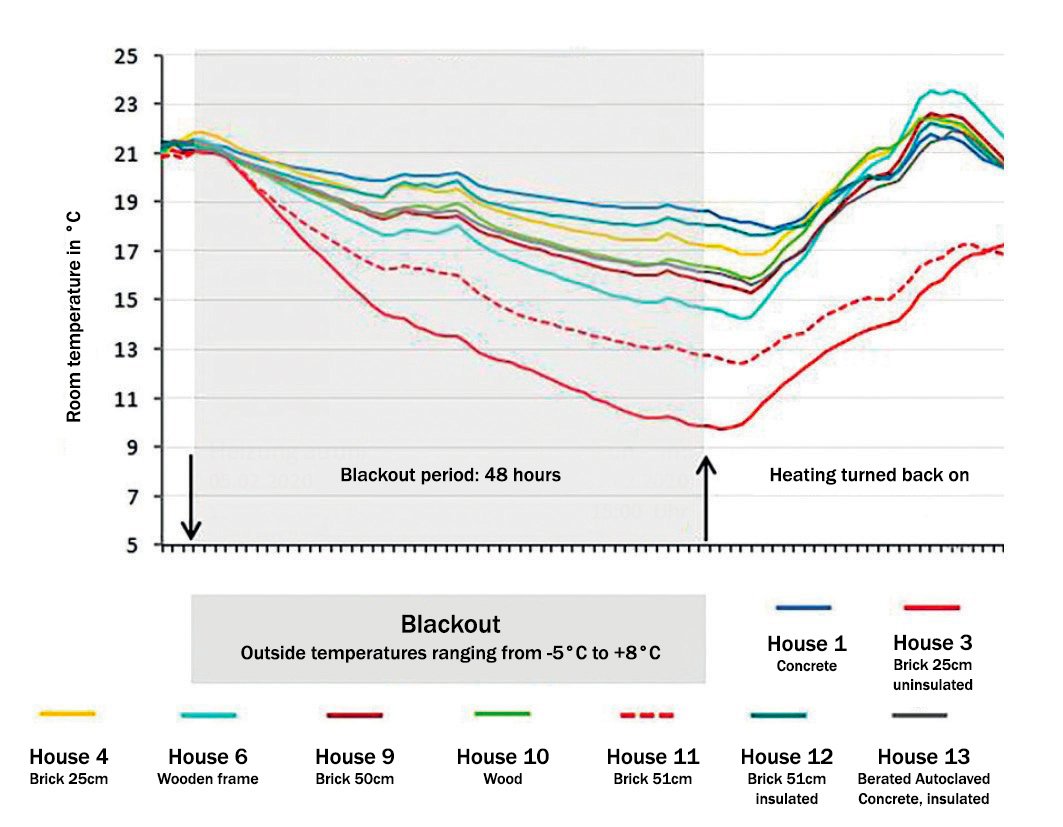More leeway in the event of a heating failure, significantly more bearable temperatures in the event of a heat wave: solid houses insulated with an external thermal insulation composite system (ETICS) make it possible to bridge a 48-hour heating outage in winter and achieve bearable indoor temperatures in summer without the need for air conditioning.
In a comprehensive study, the experts at Baumit's VIVA research park simulated the effects of a 48-hour heating failure at temperatures around freezing: for this, the heating was switched off in 12 houses in the research park. The initial indoor temperature was 21°C, and the outdoor temperature was around 0°C.

More leeway in the event of a heating failure, significantly more bearable temperatures in the event of a heat wave. Photo: Baumit
During the test series, which was based on typical winter days, the lowest temperature reached during a heating failure was in the uninsulated VIVA house that had 25 cm bricks. Despite the initial temperature being 21°C, after 48 hours the indoor temperature had fallen to just under 10°C and the wall surface temperature was just under 8°C. After the underfloor heating was activated again, it also took at least three full days to reach the starting temperature again in the uninsulated houses.
In contrast, in the insulated, solidly constructed houses the average indoor temperature after 48 hours was still a tolerable 17°C. The average wall surface temperature was still 16.5°C. The comfortable temperature of 21°C was also reached again after just one day with the heating back on. This is a significant difference, which by ensuring exactly the same framework conditions, can be attributed exclusively to the façade insulation.

New VIVA test series: solid houses insulated using ETICS mean air conditioning is unnecessary and the façade insulation has a decisive influence on achieving a pleasant indoor climate without consuming energy not only in the winter, but also in the summer. According to the Central Institute for Meteorology and Geodynamics (ZAMG), summer 2022 was the fourth warmest summer in Austria since records began. One hotter-than-average summer after another is being recorded. Despite rising energy prices, the hot summer has made many house and flat owners want to install air conditioning. This increases energy consumption and costs. This is where a second test series in the VIVA research park is of interest. Data measured throughout the summer show that in a solid house equipped with a suitable external thermal insulation composite system (ETICS), the maximum recommended comfortable indoor temperature of 24°C was not significantly exceeded on any single day. In other words, air conditioning would not have been necessary at all. However, there was a completely different picture when it came to the uninsulated house: here, it would have been necessary to use air conditioning for a total of around three weeks. That would have meant energy consumption and costs for three weeks, while in the insulated solid house no energy consumption and no associated costs would have arisen.
In the months of June, July and August, the daily average indoor temperature values in the uninsulated structure were more than 24°C on 20 days. During the same period of time, the temperature in the solid houses with ETICS was constantly below or at a maximum of 24°C. Based on adhering to the general recommendations for an indoor temperature of 20–24°C, in uninsulated houses air conditioning would have been needed for 20 days this year. In contrast, it would not have been required at all in a solid house insulated with ETICS.
“It makes a noticeable difference whether a building is insulated or not and also whether it was built as a solid or a lightweight structure. Regardless of whether it is winter or summer, the combination of thermal insulation and storage mass prevents rapid cooling or heating. Every square metre of façade that has been thermally and energetically renovated saves up to 100 kWh of energy per year, makes air conditioning unnecessary, protects against short-term technical failures and significantly reduces CO2 emissions. Only the the non-use of heating and cooling energy is climate-neutral,” concludes Georg Bursik, Managing Director of Baumit GmbH, regarding the results.
